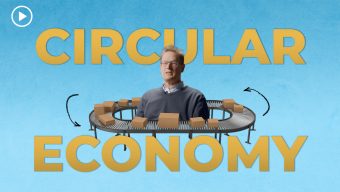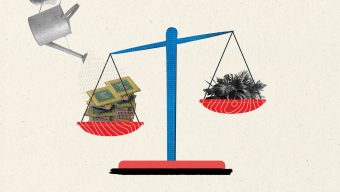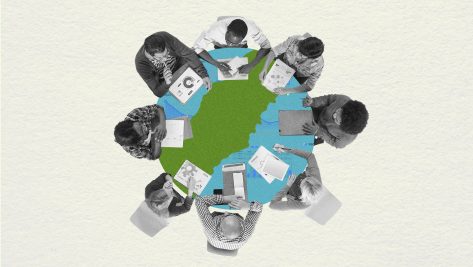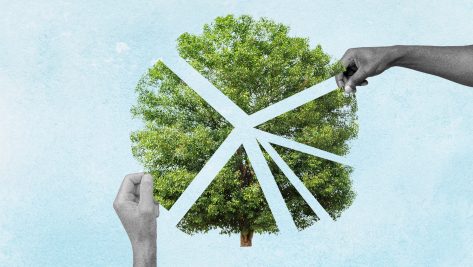In Conversation: Sustainability
José Luis Blasco and Concepción Galdón discuss the steps organizations and individuals can take to push the transition toward a sustainable economy.
© IE Insights.
Transcription
Concepción Galdón: My name is Concepción Galdón and I am the Director of the IE Center for Social Innovation and Sustainability. Inside the IE Sustainability Office, I also run all the academic side, the research and sustainability content of our programs.
José Luis Blasco: My name is José Luis Blasco, I am the Global Head of Sustainability at Acciona, an infrastructure and energy company with many international operations.
CG: Well, thank you very much José Luis for accepting our invitation to talk about sustainability today. The first thing I would like to ask you, just to get the ball rolling, is what has happened to us with the whole idea of sustainability over the last few years? Because unfortunately, poverty is not something we have just invented. The first articles in scientific journals on climate change were published 50 years ago. Inequality, unfortunately, is also older than the hills. These problems of biodiversity, of managing resources, have been piling up for decades and yet, there is still no social catharsis about looking at these concepts from another angle, with another responsibility. What do you think has happened?
JLB: Before the pandemic, we had already reached a point where we had the feeling that the market economy, which had brought such amazing results, we have had 30 or 40 years of incredible growth. We have taken 300 to 400 million people out of poverty. We have tried to develop technologically and to bring welfare to more and more people, but it was a system that, to a certain extent, we all knew had gone off the rails.
We had seen how climate change was starting to become an emergency. There was a kind of consensus on the need, not only for the public sector, but also for the private sector and the general public to be part of a new way of thinking. And I think that the pandemic has speeded this process up. I think for me there are two main ingredients that have catalyzed this change.
Discontent is one. People were angry, we have seen numerous protests, not only the yellow jackets in France, we have seen others in Chile, in Lebanon. In Colombia people were talking about the right to be angry. I have the right to be angry and to be out here on the streets showing people how angry I am. That situation has given us a different wakeup call. We’re also going to see where they’re going, where things are heading. But I think that the major trigger, which first made boards of directors, but also parliaments, make a move was the climate emergency.
I think it has made everybody more aware of the fact that we have a very short amount of time to react to a problem that can inexorably transform our relationship with the planet and, therefore, our development model. We need to rebuild the derailed train in a different way, to make it work for the people and for the planet.
CG: Some people have turned capitalism into a cult, as something that they have to protect. But, on many occasions, the best way to protect something is to help it move forward. When it moved forward in the 1960s, it was a time that coincided with the change, the exceptional growth of the economy, which is absolutely compatible.
When the economy starts to grow and the middle classes emerge and they start to demand that the economy should work differently. And this actually happened and this coincided with the first time that mankind was able to disconnect economic growth from its primary source of energy, which was people, and we can see this in the statistics. So, it was a time that we saw as being special, but it wasn’t that special. We have already had a period in history when we changed capitalism to a better version at the time, which was also thanks to the transition, through the economy and through innovation, to new energy sources, and that should not scare us. Totally the opposite, it is very exciting and it goes hand in hand with a part, I think, that is more humanist, more people-centered, of a certain pride in participating.
JLB: This is a time when those who will succeed in the year, I mean, in the 21st century, will be those who are capable of understanding that the world is more complex, that we can optimize more than one income statement, that this complexity is going to give us new prosperity. I believe that this new capitalism, let’s call it that, I think there is a different understanding of what the elements to be optimized are from a public or private standpoint. In this new capitalism, we are going to be able not only to survive, which is the feeling we often have, in order to renew.
CG: In fact, I often feel that we have been really efficient and quick in getting to a place we don’t really want to be in. We have to change direction. It’s not just that we’re not going downhill extremely fast, it’s that we have to change the direction we’ve been going in completely. Which is what you were talking about in terms of renewal and I think we also have to connect with the world of ideas, of thought, of philosophy, of valuable things, because our idea was to separate the economy as a science from the reality of the societies in which it operates.
And the fact is that economics is a social science and often we make mistakes when we want to dice up situations, instead of tackling a world that is complex, that does not fit in a double-entry matrix, and where we have abandoned things along the way. How we have looked the other way, when there are many realities which we needed to factor in and I do sincerely believe that capitalism is a very important tool to create welfare and I believe that because of its importance, we need to make it move forward.
JLB: There is also a great opportunity from the point of view of innovation and business. Let’s not forget that this has nothing to do with the downturn, it has nothing to do with, let’s say, with being worse off. We are talking about an approximate investment required solely for the climate, to achieve that net-zero that we need by the middle of the century to be able to not consume that meagre carbon budget that we have left, so we’re talking about trillions, we are talking about 3.7 trillion in investment in areas such as, not only energy, and not only transport and largescale industry, but we are talking about a huge opportunity to reindustrialize our continent.
And I think that Europe has decided that this model of a different capitalism, brings a competitive advantage in a new world. But let’s not forget, I think there are also some major threats in this transition. The main threat is to understand that our development model cannot be dominant, cannot conquer the entire planet, we are not always totally right. We must work on opening up, on being permeable, on interconnecting, because otherwise we will end up leaving out people who think that this world has to be transformed in different ways. And I’m very concerned that things that we take for granted, which in the market economy development model are essential, are the operating system, need to be shared by other cultures.
CG: When a change takes place in a period of history, then historians choose a date, whatever it may be, to say it was the day of this war or it was the day of such and such. But, actually, historical changes do not happen on a particular day, they have been going on for decades and they are consolidated over decades. And I believe that, in the future, we will realize that we have been involved in a historical change, which I don’t know whether historians will say that the change was confirmed when the war in Ukraine broke out, or during the pandemic, or what day they will say marked the change, but I know that we are a part of this. We have to look at new ways of building our value chains, new ways of functioning that enable us to be profitable, because we are sustainable.
JLB: When we talk about 2015, I am referring to this year because it was a time in which several things came together. First of all, perhaps we actually became aware of the reality of climate change and the climate emergency, with the Paris Agreement, which gave us a clear sign that the future is going to be carbon-free. But there is a second milestone that seems to me very relevant, which is a political fact, which is the creation of the 2030 Agenda, the Sustainable Development Goals.
We are going to work on the links and the tradeoffs between, for example, water, food, and energy. Or we’re going to talk at some point about how social inclusion will be a key element when it comes to thinking about this new future, about the 21st century. And the complexity of having to link these different challenges, I think that’s going to be where we are going to have winners and losers, winners and losers from the point of view of the companies that are able to read this context, this change and also from the point of view of people, of how we adapt.
CG: We can actually do a foresight exercise of trying to pinpoint things that are already happening now and that are like little windows opening onto the future. And I see it in many industries. For example, in the fashion industry, when we talk about sustainable fashion it’s almost like a contradiction in terms, but we are starting to see companies that are starting to think about fashion not in terms of collections and convincing you that what is good for you today isn’t good for you tomorrow, where you end up buying and throwing away, and buying and throwing away.
But to start thinking about clothes as timeless collections, pieces that you can wear forever that are made differently, with totally different technologies, not like before when jeans were stonewashed in incredibly harmful ways, both from a social and environmental standpoint. Now they use technology which consumes 1% of that amount of water, does the same job, and also creates a totally different relationship with those pants or whatever it is, which lasts over time.
JLB: We’re seeing new business models. For example, in the field of cars, tires, automobiles, which means that I want to move around or I want to own a car and how I relate to that, and companies learning how to make money from their assets in a different way. I think we are going to have new models in which people are going to be more like managers, more active players in this service, and are going to have more to say about them, about ourselves. And we’re going to be able to contribute in that relationship. I believe that at some point in time consumers are going to become prosumers in that they participate in the efficiency of the product or service.
We are very passive. This point is really important because it will transform many industries. We’ve talked about, you mentioned the case of fashion and of mobility, but let’s look at one of the most important when it comes to transformation, for example, food agriculture. We are talking about an industry that emits approximately 20% of greenhouse gas emissions with some clearly defined structural elements, which, in the case of infrastructure, is especially important. The productivity ratios of an industry which is so essential for the economy, as is the construction of infrastructure, instead of increasing, simply remain stable or are decreasing. In the end, infrastructure has two characteristics that make it unique.
The first is that, to a certain extent, it is a society’s operating system. What we do now, what we build now, the way we develop our water supply, energy and mobility, is going to last for 100 years, it’s going to last over time. And in 2050, those assets have to be completely decarbonized, if they are to be compatible and be valuable. But, on the other hand, infrastructure’s ability to transform from the point of view of renewal is extremely important. We ask ourselves in daily examples, well, why can’t roads produce energy? For example, storing water for irrigation or transforming the land.
CG: You were talking before about the role of the consumer, but also, about the role of all these people who share their generation with older people, but who share this idea, this objective of participating in transforming the world so that one can be successful, while generating success for others and for the environment.
And what happens is that these customers and these employees, because they were born into a world where technology already exists, so that products and services are sustainable from a social and environmental point of view, cannot understand why companies do not ensure they are sustainable. This is also what often happens with some executives when they suddenly understand that they too can do things differently.
JLB: Sustainability, the word cannot stop us from taking action. The word is nothing more than a term and a beautiful concept, which we have subverted to a certain extent. To some extent we have popularized it, we have trivialized it. But really, those executives need a new, different term, so they can make that click that you’re talking about and put on those glasses that will enable them to see where the real waste is occurring, where there is real efficiency not only from an economic point of view, but from other income sources.
How their employees are part of that project, how those people that are working in their teams can have that same objective to work in businesses that improve, that transform the way we are moving forward. That’s where I think our really big challenge is. Our big challenge is that we’re very, shall we say, very good at asking questions. What’s going to happen with our water? What’s going to happen with climate change? What about inclusion? But now it’s time to give answers.
CG: We have to move out of the core of sustainability experts, because the answers are not going to come from sustainability experts, they are going to come from professionals. The one who is best able to think of a new way of making a production line is the one responsible for that production line. The person who can best rethink a factory is the person who works in the factory. The one who can best think of a new material or the one who can best think of a new way to create a business model, is the person who has the Excel, the owner of the financial part of that business model.
What I think we need is to step away from the mainstream discourse, from basic discourse, let’s say, and more towards raising awareness. I think it has played its role and that it was important, but it ended up being very restricted to a number of people who felt that it was their conversation. But we have to come around to understanding that this is everybody’s conversation.
So, no one can be the best professional without taking a sustainable look at what they do, because at the end of the day, being sustainable means that what you do can last over time and that it can be successful over time. And to do that we need to protect the environment where everything is manufactured.
And this is an invitation to all the people, to all the engineers and all the technical people. To what? Not to become sustainability experts but to be the best engineers possible.
JLB: We are confronted with the fact that the professions of the future, which are going to need these new skills, still don’t exist. Not even the educational system responds properly in training financial experts, or sustainable financial experts or sustainable engineers. The main problem is that, for this to actually happen, we need a basic ingredient which is authenticity.
For a long time, we have been taught that to reinforce the economic variable, the social and environmental variable had to be taken into account. What we call ESG, to a certain extent, Environmental, Social and Governance, and this made better companies. Of course, this is totally right, totally right. And those key criteria were found in most companies, but especially in European companies, where in any of the conventional sustainability ratings they were generally right at the top, in tier one.
But we’re not talking about that. We are talking about companies that transform, not just what they are, but how they do it, and we are also talking about what they do. To change the direction of the companies it is not enough to ask good questions, it is the strategists, the financial experts, the engineers, the sales force, the human resource people, the people who actually drive the key four or five processes in the company, who take on board and work together to deliver that change. And that change requires conviction, but I insist again, it requires authenticity.
CG: It’s something so big, it’s something so complex that it takes on so many different forms in different industries, in different areas that it’s impossible.
When somebody comes to me and says, I know about sustainability, but what about sustainability? Because, for example, I personally know about sustainability in general, more than any person walking down the street nowadays, but mostly I know about the social side because that’s what I’ve worked in the most. But the man or woman, all the home, let’s say, it gets to a certain point, but there comes a time when the real solutions have to have owners who are technically competent, not in sustainability, but in their industry and in their specific field of knowledge.
JLB: I believe that the same thing happens in all companies. There are some key competencies that make the difference, the ones that really make for a successful business project, which must be the drivers of sustainability. Ok, our company uses a lot of diesel and we need to replace these 30-tonne machines which move tons of land to build large infrastructures and they have to be built differently.
CG: A Board of Directors today that does not know enough about sustainability-related issues is neglecting its duty to the company’s owners, because it is not able to support the company in a matter that is fundamental in terms of the transition that is taking place. Today, any company should be very apprehensive about having employees who are illiterate in sustainability.
JLB: At the very least, they are not rounded professionals in changing and making decisions in a different context. Because, ultimately, we decide which products we put on the market, where we put the production plants, which customer segments we target, which employees, what talent we are using. To a certain extent all of those signs give rise to, appeal to a certain, let’s say, type of investor.
If one makes short-term decisions with quick returns, you put out signs that you want short-term investors as your shareholders who demand very short-term returns. But if you make long-term decisions which are healthy for the company, taking into account that new context, the company will attract a new, more numerous investor profile.
CG: We were talking about the fact that we really need to draw up a new social contract. And we were talking about the fact that, in this transition, there are going to be winners and losers, both at industry level, you were saying a while ago, and at people level, and a lot of people are rejecting this change, and this world that’s going to change. Because they are very aware there are going to be many losers.
And I don’t think we need to gloss over this. We have to be aware that this is going to be the new norm. So, I often ask myself how can we manage this? It’s ridiculous to think that a man who today works in a coal mine, is going to be an artificial intelligence systems architect tomorrow.
JLB: It’s much more complex. We have witnessed a transformation, the digital transformation, and we’ve seen that divide, that fracture. But, the decarbonization divide is going to be much more complex to manage than the digital one.
The skills, as you rightly say, to be able to make that transformation sustainable, are quite different from the ones required before. I would like to analyze two issues. The first issue is, we already know what’s going on. For example, right now, an engineer coming out of college, who graduates from university, or a person who is going to look for a job, knows the industry perfectly well and the future of the industry and the capacity for transformation of the company they are applying to. Asking questions inside and outside the company, helps those changes to take place.
And for me it’s important that as soon one talks to the company’s management and asks questions about this, it helps to adapt and to mitigate let’s call it the potential or the potential risk. And the other part, or the second important issue here is we shouldn’t settle for half-baked solutions. And the temptation is that those transformations that we need, for example, to decarbonize the economy, lie in intermediate technologies that are going to make us go back through the transition stages of those people in the future.
And I’m going to give you a very clear example, gas, for example. I mean, gas emits CO2. Sorry. Moving from a coal and mining industry to a gas industry and then to a renewable industry, wastes precious time. I mean, let’s be practical, let’s take the plunge, let’s build that momentum, let’s put the resources in place and let’s do it once and for all.
CG: But we have to design that transition. It is not going to happen on its own, which means that is not reasonable, or it doesn’t seem reasonable to me, to say no. Because climate change is so important, nothing else matters. And then we’re going to move forward quickly on climate change. And we need to make the man who works in a mine today see this. Because if not, as the planet is going to die, it doesn’t matter. Hey, it does matter because there are many families, a lot of people and because if you only care about climate change, you should be worried about inequality and you should be concerned that for that transition to be effective, these people need to find their space in this solution.
And I think this is something that we are missing at country level as well as at individual company level, and that is to devise strategies to support people in the transition, who, by the very nature of the transition, if they are not proactively helped along, they are probably going to be left behind.
JLB: Yes, but Conchita, you need to remember something we are currently investing almost the same in fossil fuels as in renewable energies, and we mustn’t be under any delusions. The budgets of the EU Member States which have decided to be carbon neutral, cannot be used to build infrastructure or equipment that are going to produce CO2 in the future. Because we are sentencing all these activities to stop being useful, to being obsolete assets in the short term.
CG: What all of this means in the end is that people need training and everyone needs an education at all levels, starting with the youngest children, I think, but also, top executives and CEOs. I believe that the role of education to move towards that decarbonized, sustainable future requires different skills.
JLB: I believe, and to be more specific, let’s say skills that are going to be needed in the next three, four years, and that everybody who wants to have a successful career should know. The first, and I think essential point, is coal. The great disruption, Europe, basically, has decided to reindustrialize via decarbonized industries. By law we need to be carbon neutral by 2050. This is a key challenge. But do we know where the emissions of our products are generated?
Upstream, in our suppliers and raw materials? In our manufacturing processes? At the customer? CO2 or methane or any of the other greenhouse gases need to be understood. A second skill needed, also with the planet in mind, is whether products and services are circular.
How can we reduce our consumption of natural resources across the board. But if we move to the social side, we would be talking on the one hand, about the usefulness of products so that they are accessible to large parts of the population. We were talking to a certain extent, that democratizing access, so that progress reaches everybody, is a very important variable in product design.
CG: I would say two things. On the one hand, ensuring your product or your service is materially accessible to everyone. That message to the bank. Many people want to pay your commissions, why do you stop them? But also, how we understand the social dynamics that we create through the way we pay wages, through the way we accept or do not accept the new social contract we need to draw up and how the future of our companies affects the social and, therefore, political context.
And that, when we complain about political polarization and the problems that this creates, how we, as a company, how we educate or don’t educate our employees, how we help or don’t help our employees, how we educate or don’t educate society, our environment, and how we reduce inequality by lifting, by lifting people up from the bottom, we affect that context, how we protect the middle classes.
JLB: Each one of us in our positions of responsibility, we have to be truly, or we have to strive more and more to become agents of change. I think there are many things to change and the core competency at the end of the day in a professional is to be able to transform, to lead those changes or to participate in them. You don’t have to lead but you can always participate. And I think the sustainable part requires cross-functional, cross-disciplinary consensus in many parts of the company.
CG: How can I continue to be very competent in the specific area I’m in, but also know how to link it? How this has an impact on the level of all the communicating vessels with the rest of society, the environment, the operational context, etc. And in the end, I think it’s realizing that the world is going to change and it’s going to change with or without you, and you need to train yourself and be competent to participate in that change.
© IE Insights.










